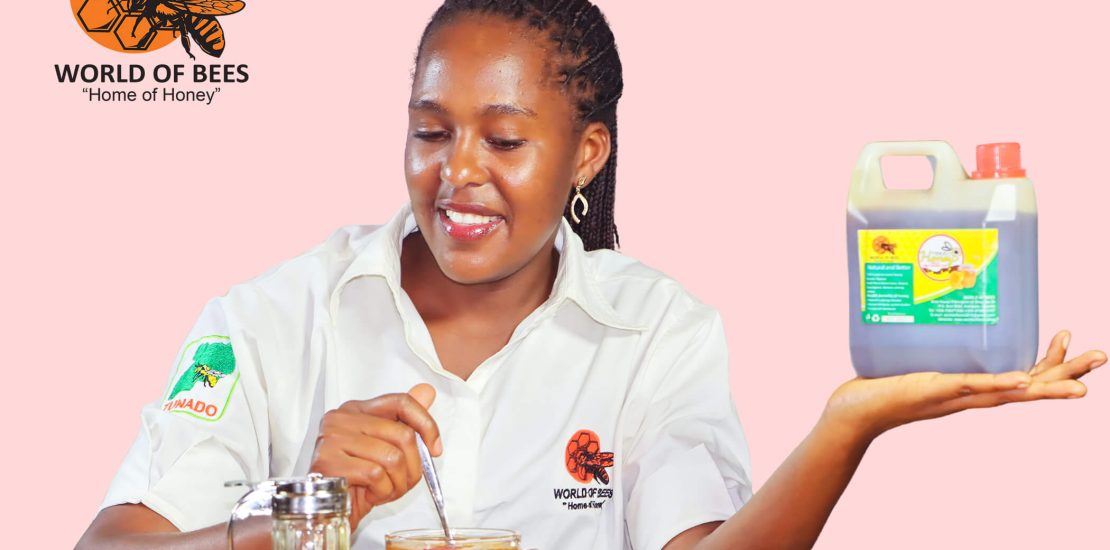- October 7, 2025
- Posted by: steven muwanguzi
- Category: News

About five years ago, it was quite common to hear beekeepers lament about the lack of a reliable market for their honey and other hive products. Many farmers, despite their dedication and effort, struggled to find consistent buyers. This challenge became a recurring concern within Uganda’s beekeeping community, especially among producers who form the foundation of the sector.
During one of the TUNADO Annual General Meetings (AGM), members reached a pivotal resolution—to establish a social enterprise that would bridge this gap by creating a sustainable market for honey and other hive products. This marked the birth of World of Bees (WOB).
The primary mission of World of Bees was, and still is, to provide market access for Ugandan beekeepers—particularly TUNADO members—while promoting the visibility and credibility of locally produced hive products. Like any new venture, the beginning was far from easy. It was a journey filled with challenges, perseverance, and learning curves—a true uphill climb toward a shared vision of success.
Now, six years later, it is time to take stock of what has worked well and what lessons have been learned along the way. Join us as we look back on the milestones, achievements, and growth of this innovative social enterprise.
1. Boosting Visibility for Bee Products
One of the most remarkable successes of World of Bees has been enhancing the visibility of Ugandan honey and hive products. Our suppliers and members proudly acknowledge that their brands are now more recognizable—thanks to the diverse communication platforms leveraged by WOB.
We utilize print media (such as newspapers and Api-News magazine), electronic and digital platforms (including WhatsApp, YouTube, TikTok, Facebook, and X), and mainstream channels like radio and television to showcase member brands. Through these avenues, WOB has not only expanded local brand recognition but also positioned Ugandan honey on the global map.
The TUNADO and World of Bees websites have further amplified this visibility by connecting producers to an international audience. Our products are now viewed by millions of people across the world, including those in the diaspora—a remarkable achievement for Uganda’s beekeeping sector.
2. Expanding Market Access for Members
The establishment of World of Bees was driven by a simple yet powerful goal—to secure consistent and profitable market access for beekeepers. Six years on, we can confidently say this goal has been achieved.
Every registered TUNADO member who signs a supply agreement with World of Bees gains direct access to structured, transparent, and reliable markets. Several member brands—such as BENA General Agencies (Nice Honey), Kitgum Honey, Westlink Delicacy Api-group (Kisoro Pure Honey), and Bunyangabu Beekeepers Cooperative (BBC Honey)—have benefitted immensely. Their products are now recognized both nationally and internationally through WOB’s strong marketing linkages and promotional strategies.
This achievement has not only strengthened livelihoods but also increased confidence among producers, proving that organized market access can transform the beekeeping value chain.
3. Providing Professional Consultancy Services
Beyond marketing and trade, World of Bees has grown into a trusted technical partner for organizations working within the apiculture and livelihood sectors. Over the years, we have offered consultancy services to several national and international NGOs, providing expertise in areas such as beekeeping enterprise development, value chain analysis, and capacity building.
This collaboration has been mutually beneficial. While NGOs benefit from WOB’s technical guidance to achieve their project goals, WOB gains valuable experience and visibility as a professional service provider. This partnership model has enhanced project outcomes, improved implementation efficiency, and boosted the reputation of partner organizations as effective and impactful actors.
Some of the NGOs that have entrusted World of Bees with consultancy assignments include Mercy Corps, ZOA, and the World Wide Fund for Nature (WWF)—organizations that have recognized WOB’s professionalism, reliability, and deep sector expertise.
It is evident and many current suppliers to WOB can attest to the fact that our members’ brands are more visible because of the media presence that we have as World of Bees.
It is widely understood that Uganda operates within a free market economy, where trade in goods and services is guided by the principle of a “willing buyer, willing seller.” In such a system, pricing is ideally determined after thoroughly analyzing operational costs and then applying a reasonable profit margin.
However, for many rural beekeepers and small-scale farmers, this concept is not always well understood. To bridge this knowledge gap, World of Bees (WOB) has organized a series of pricing and market literacy trainings targeting bulking center operators, traders, and farmer leaders across the country.
Through these trainings, participants have gained a deeper understanding of cost-based pricing and market competitiveness, enabling them to sell honey and other hive products at fair yet profitable rates. This has helped ensure that their products remain sustainably priced, market-relevant, and attractive to buyers at both local and national levels.
Yours faithfully,
Amena Dennis
TBA, TUNADO
